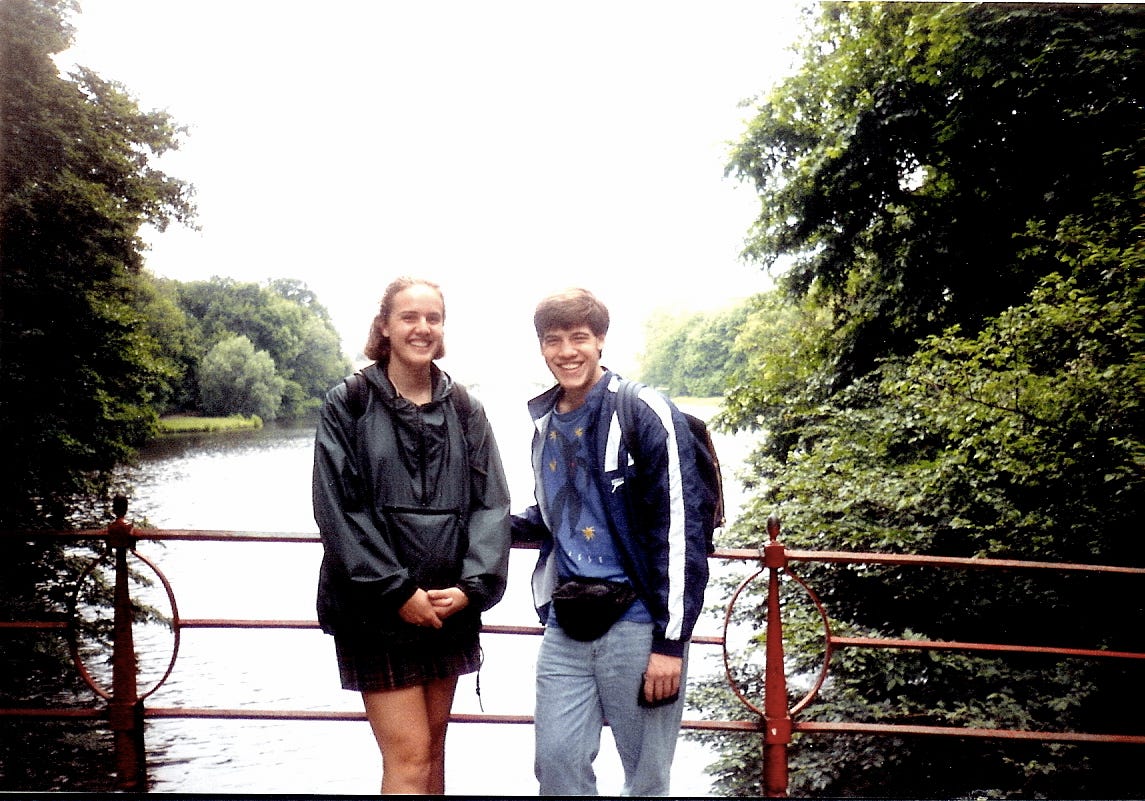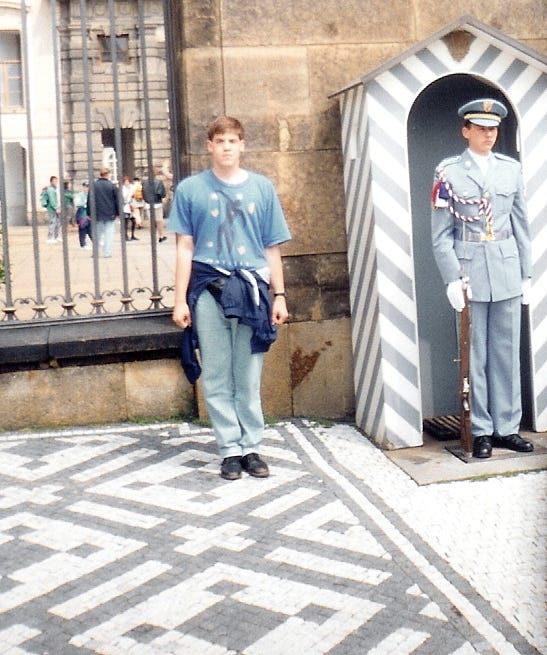Mark Twain Called it The Awful German Language
Why, after all this time, my German is kind of better than my French
It’s been about 23 years since I last studied or spoke German in any serious way. Back then I was, if not a real student of German, at least someone giving it the old college try. It was the old college try in the sense that I studied the language throughout college and then largely quit.
I studied German almost entirely because of my grandmother. She was an Austrian Jew who fled Vienna via Italy in 1939, a bit after her sister fled on the same route and before her parents fled the long way. They went by train across Eastern Europe, the Soviet Union, and Japanese-occupied Manchuria and Korea and then by boat across the Sea of Japan to Japan, and across the Pacific Ocean to San Francisco. Finally they took another train to Washington, DC, where I still pay taxes today. My great grandfather wrote an account of it. It’s riveting.
Despite the Nazis chasing her at the age of 17 from what had been a fulfilling, if not idyllic, life near Vienna’s opera, my grandmother never lost her affection for her mother tongue. She was the kind of person who would insist that the guy who translated all of Shakespeare into German was superior to the Bard himself. Having failed to get either of her children to speak the language of Goethe, my grandmother went to work on her first born grandchild—me.
Once a week, we would have a German lesson in my parents’ living room. She would try to teach me the basics of grammar and vocabulary, and I would insist “Ich muss liegen.” I must lie down. I’m still kind of surprised that I can speak any German while sitting or standing. While I in no way learned German from these sessions, I somehow got enough into my still supple brain that my German accent is, I am told, unusually good for an American.
After three years of failing to learn Spanish in middle and high school, thanks to a combination of poor teaching and poor studenting, I took up German in college. Perhaps, I thought, actually wanting to learn the language will help. I was a much better student of German than I had been of Spanish, but I was still middling. The fact that German classes my first year were first think in the morning did not help. I had been up late playing cards and eating bacon pizza the night before. Nevertheless, I completed two years of German and spent the summer of 1996 studying at the Goethe Institut in Freiburg am Breisgau in Germany’s Black Forest. I was oppressively love sick during my two months there, but also managed to have the time of my life. As I learned the ways of the world, like not to accidentally get in the first class train car, and that the sheet sack goes over the duvet rather than around one’s body like a sleeping bag, I made great friends, had great adventures, and endured my first real bout of love sickness. I’m still in touch with one friend, though I haven’t seen her in 30 years. She made baby blankets for both of my kids and sent me a Book of Mormon. I’m not converting, but the kids loved the blankets.
One weekend, I went to Prague, which in 1996 still felt exotic—it was behind the iron curtain, you know—and I danced the Macarena on top of a table at some bar. If you’d told me then that nearly 30 years later, I’d have three six-year-old girls in the back of my car dancing the Macarena last weekend, I’d have said you were mad. I always hoped to have kids, but I never, ever, thought they’d be dancing the Macarena
.
When I returned to Boston University, I took more advanced German classes for my remaining three semesters (note: I graduated early—bragging). Two of those were on translation and German poetry, real academic classes. I was by no means fluent, but I was conversant and I had a dictionary. I loved German poetry. English poetry, I just plow through—read the words, get to the end. By contrast, my very unfamiliarity with German vocabulary forced me to stop and dwell on each word, as poetry should be read. I developed real fondness for Rilke, Goethe, and Celan. And that was the end of my German education…. Well, save for six months in 2002 when I took a leave from my job in public relations and went to Vienna, the city of my ancestors, to study again. Again, I had a wonderful time, and again I was lovesick, albeit for a different woman this time. I cut my studies short and returned home for a bit before going back to Europe to travel with my brother for six weeks.
I found my certificate this week. I reached Mittelstufe 1. A certified intermediate after all of that work.
Before coming to Switzerland, I thought I had lost most of my German. I hadn’t been to a German speaking country in years, and my efforts talking to my German neighbor’s daughter had not been encouraging. Yes, I could communicate more or less effectively with the tow-headed two-year-old on the next porch, but when I talked to her grandmother, who did not speak English, my limits became evident.
That’s why I was so surprised in Switzerland to find out that I still speak German. It hit me almost two years ago on our first visit to German Switzerland, Bern specifically. When people spoke Hochdeutsch, instead of the incomprehensible, sing-song Schwitzerdeutsch, I could hear every word and understand many of them. I ordered food, asked questions and, generally, functioned. I still spoke the same mediocre German I had all those years ago. This was only confirmed when I drove to Bavaria and Austria with my kids and my mother that October.
What amazed me is that, while, after ten years of part time, off and on study of French, I read French far better than I ever read German, I have a certain casual comfort with the German language that I still have not developed with French. I can comfortably use a certain number of casual German expressions and not-quite-in-the-dictionary vocabulary. I can make casual banter with a certain fluidity. My French, by contrast, is formal and rigid. I talk like they do in the textbooks, technically correct, but without humanity or soul. Even the most common slang baffles me as do most abbreviations. My accent is abysmal, as my children never tire of reminding me. Indeed, one day I spoke German to an intern at C’s daycare who came from German Switzerland and the other teachers were shocked by how good my accent was after listening to my garbage French accent all year.
I think there are a few reasons for the discrepancy. First, I think the German training at a young age got the accent stuck in my head. A German accent is closer to an American accent than a French one is, but even accounting for that, I think those Tuesday afternoon sessions with my grandmother made the difference. When she tried to get my father to speak German in his boyhood, he would declare “My mouth won’t say that!” My mouth, by contrast, will say that.
Second is the difference between studying a language in your youth and as an adult. Not only was my more-creased teenage brain ready to receive and retain information, but I lived more in the casual world of global youth culture where people talk “normal.” My default in German is the familiar “du” form of the second person. Having learned French entirely as a professional adult, my default is the formal “vous.” I talk French like a middle-aged professional because that’s what I am, and I speak German like a punk teenager, because that’s what I was.
I’ve almost certainly spent more time studying French than German now. I’ve done study abroad for French twice and German twice, and I’ve lived in a Francophone country now for two years, doing things like registering for school and buying snow tires. But being in Bern yesterday, I was again reminded that German clicks in my brain in a way French hasn’t yet and perhaps never will.
But that’s okay. I can function in either language and that counts for something, especially in one of the few countries where they are both really useful. Many, many years ago, while I was learning German with my grandmother, she told me she spoke four languages, English, German, French, and Spanish. I told her that after I learned German, I would like to learn the other two. As I struggled with German, that seemed more and more impossible and yet, here I am—sort of trilingual. Now if only I hadn’t been such a bad student of Spanish.






Your German and French relations are the opposite of mine! I learned French first in the US (le langage de la diplomatie) and spoke with a lovely Parisian accent, of which my francophone mother and grandmother were very proud. Six years in school and then majoring in French at university (after innumerable essais on French medieval literature, I dropped that for art history).
I started learning German only in high school, going to night classes to prep for an exchange program-slash-youth orchestra tour. Not really sustainable, but having German penpals after that trip I continued to feed my curiosity about the language. In the intervening 40-odd years, I moved to Europe, worked for a German company for a decade (though NOT in Germany), fell in love with a former penpal, got married and moved to Switzerland.
Now I speak French with a German accent. Zut alors, as Mademoiselle Jourdan, my first French teacher, would have said.
“the sheet sack goes over the duvet rather than around one’s body like a sleeping bag”
I’m sorry, what? I don’t think I ever actually bought a sleep sack but I read about them ahead of a French backpacking trip and always assumed it was a body sack not a duvet sack.
My 2 yo niece is apparently learning the months through the “months dance”… which is the Macarena. Turns out I know the months dance, too.